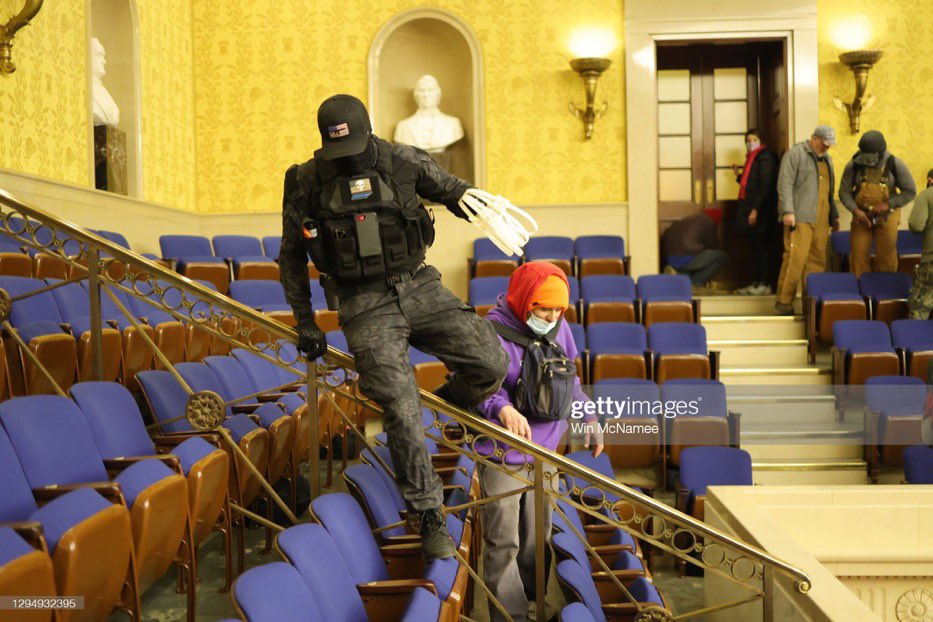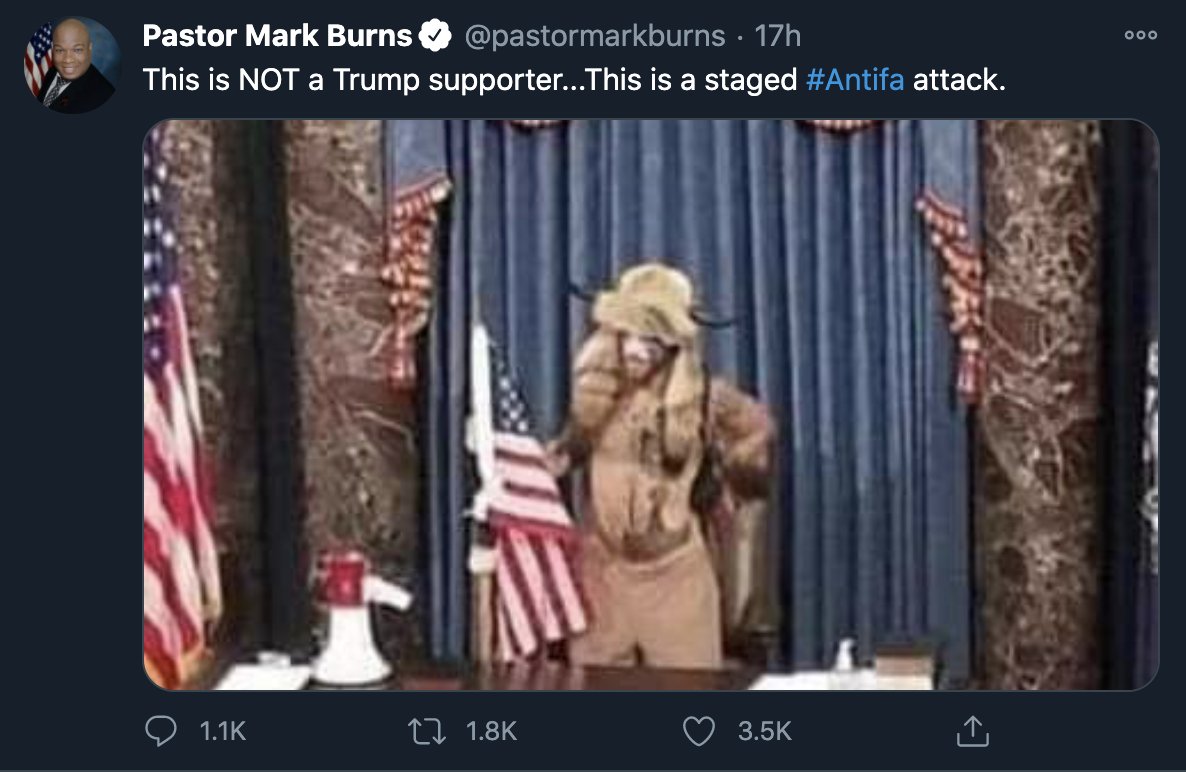
This is a great question from @HeerJeet and it has very old roots. In my book, I discuss a similar period of anxiety in the 1960s about the possibility of Air Force officers being involved in a coup. Thread.
https://twitter.com/HeerJeet/status/1348136129589956608
Given the size of the US military in WW2, afterwards there was a spike in concern that some of these demilitarized veterans would be amenable to radicalization and supportive of insurrection. These fears heightened after the coups in France/Algiers in 1958 and 1961.
This was the peak era of the Cold War, so anti-communist anxiety was layered over top. The Right feared that communist infiltrators in the government would subvert the Republic. The Left feared that anti-communist military officers would launch a preemptive, paranoid coup.
Note as well that the foundation for these fears was rooted in a novel concept that journalist Edward Hunter had recently coined, "brainwashing." The idea was that US POWs held by North Korea had been brainwashed into accepting communism & might act as a fifth column back home.
You can see that particular paranoia in cultural artifacts from the time like "The Manchurian Candidate," novel in 1959 and the hit 1962 movie starring Frank Sinatra and the incomparable Angela Lansbury. Those sneaky commies nearly infiltrated the Oval Office itself, oh no!!
But there was another variant on this fear, not that communists themselves would infiltrate and overthrow America, but that overzealous military officers would launch a coup in the paranoid determination to defeat communism both real and imagined.
This was a recurring plot in film and tv in the early 1960s, from "Dr. Strangelove" (general obsessed with "precious bodily fluids" being corrupted by Soviet fluoridation) to "7 Days in May" (foiled coup to remove the heroic president and his cabinet).
Indeed, in "7 Days in May" the villain is an air force general and former flying ace. This was no accident as the character was modeled after several actual right-wing military officers of the time, including Edwin Walker, Douglas Walker, and Curtis LeMay.
President Kennedy had actually read the novel "7 Days in May" and was convinced it was more than fiction & an actual imminent threat. So much so that he invited the filmmaker to film the movie at the White House; they even used anti-Kennedy protestors outside as impromptu extras!
Why was Kennedy so paranoid that he thought 7 Days in May felt like a documentary instead of fiction? (In his defense, so too did many at the time, with "Variety" writing, it is "an exploration of what could conceivably happen momentarily.")
1) In 1960 there had been a big scandal involving a training manual being used by the Air Force. In 1958, the National Security Council had ordered the military to conduct anti-communist education of all servicepeople.
The US Air Force had been particularly...enthusiastic. In this training manual, they illustrated the supposed threat of domestic communism by alleging that they had infiltrated every branch of government, the Democratic Party, labor unions, and the National Council of Churches.
They used as "evidence" materials from conservative anti-communists, especially right-wing radio broadcaster Billy James Hargis. Hargis told the press that the National Council of Churches "has done more to nurture Communism than any single organization" in the US. Well, then!
The National Council of Churches was the largest religious organization in America at the time and had significant pull in Congress, which subsequently pulled the offending manual.
The NCC also asked Speaker of the House Sam Rayburn to arrange a series of floor speeches defending the org. One of those speakers was none other than John F Kennedy, who said, "Our Government cannot...select any religious body for either favorable or unfavorable treatment."
Kennedy's adept handling of the "religious question"--his Catholicism and calls for religious tolerance--helped him win a crucial primary in West Virginia three weeks later and, of course, the presidency.
So you can imagine why Kennedy was particularly attuned to the threat of subversion of his administration via the military and right-wing misinformation, and from the Air Force in particular.
2) I won't belabor this point since it's a significant subject in my book, but just a year or two later that same broadcaster, Billy James Hargis, linked up with Edwin Walker, a general that Kennedy had just forced to resign for his anti-communist conspiracism.
Walker & Hargis called their presidential test run "Operation Midnight Ride." This was not a reassuring name if you were worried about a coup, an angry ex-general holding political rallies under the banner of revolutionary Paul Revere! One if by Congress, two if by White House!
Ultimately, the Hargis/Walker campaign didn't go anywhere, though it was a precursor to a campaign that did do surprisingly well, that of George Wallace and ex-Air Force General Curtis LeMay in 1968.
3) The final thing I'll mention here is that these left-wing fears of a right-wing military coup peaked in 1964 with the presidential bid of Barry Goldwater. Why?
Because Goldwater was a major general in the Arizona Air National Guard.
Because Goldwater was a major general in the Arizona Air National Guard.
As an aside, both Goldwater and LeMay were big fans of the B-52 Stratofortress, with Goldwater flying one and LeMay fighting for the funds necessary to build them.
Why is that a big deal? Well, the B-52 was a strategic bomber, which meant that it's main function in the pre-ICBM era was to deliver nuclear payloads. It's the plane in Dr. Strangelove and all those movies that starts WW3.
Lyndon Johnson's campaign created one of the most infamous political ads of all time to suggest that Goldwater--who, again, flew these aircraft--would, if elected president, drop nukes willy-nilly and start a world war.
It is hard for folks today to understand just how intense and widespread this fear of a right-wing military coup that kickstarts WW3 was. JFK truly believed it, LBJ traded on it. Movies featured it in their plots.
But that fear extended even further to...Lee Harvey Oswald.
But that fear extended even further to...Lee Harvey Oswald.
Months before Oswald assassinated JFK, he first took a shot at ex-general Edwin Walker when he was at home on a break between Operation Midnight Ride rallies. But Oswald's bullet deflected off the kitchen window frame and only wounded Walker while he was doing his taxes.
When Oswald's wife questioned why he thought he had the right to shoot Walker, he replied, "Well, what would you say if somebody got rid of Hitler at the right time?"
Fear of a military coup--perhaps especially via the Air Force--was pervasive across the entirety of the Left in the early 60s.
Indeed, it was why so many folks initially assumed a right-wing assassin had shot JFK in Dealey Plaza later that year.
Indeed, it was why so many folks initially assumed a right-wing assassin had shot JFK in Dealey Plaza later that year.
And why some of the first conspiracy theories about the assassination percolated up on the Left, not the Right, and involved the belief that right-wing military generals had conspired to have Kennedy killed to stop him from stopping the Vietnam War.
As for why the Air Force in particular tends to be the locus of these kinds of fears--whether real or imagined and whether in the 1960s or today--I don't have as firm an answer.
I can tell you that in the 1960s a big reason was that the limits of our technology meant that every Air Force pilot, once up in the sky, had the final authority to decide whether to drop nukes or not.
Unlike with ICBMs, which have a whole set of processes to start a launch (the nuclear football, multiple launch keys in multiple sites, etc), a B-52 only needed the agreement of the two pilots to drop.
That means two 20-somethings could start WW3 if they so chose.
That means two 20-somethings could start WW3 if they so chose.
That's an awesome amount of responsibility to invest on so slight a set of shoulders. It's no wonder that it freaked out people at the time! It's freakin' me out right now just thinking about it!
The fragility of the entire system is highlighted by just how damn often B-52s with nuclear payloads had accidents, like when a crashed B-52 nearly detonated Goldsboro, NC.
en.wikipedia.org/wiki/1961_Gold…
en.wikipedia.org/wiki/1961_Gold…
All of that to say, it would be significantly easier for an Air Force General to launch a coup than a general of any other branch.
All you'd need would be a small cabal of officers. One group takes the White House; the other takes flight in a B-52 armed with nukes.
All you'd need would be a small cabal of officers. One group takes the White House; the other takes flight in a B-52 armed with nukes.
Now, that doesn't translate today, so it's likely any connection has more to do with the particular structure / culture of the branch and training system. Keep an eye out for William Schultz's forthcoming book on that topic, "Jesus Springs."
If you're interested in learning more about Operation Midnight Ride, check out @sissenberg's excellent article: smithsonianmag.com/history/wild-r…
And, of course, my book dives into the whole wild world of right-wing radio broadcasters like Billy James Hargis and JFK's illegal efforts to shut them down.
amazon.com/Radio-Right-Br…
amazon.com/Radio-Right-Br…
• • •
Missing some Tweet in this thread? You can try to
force a refresh






